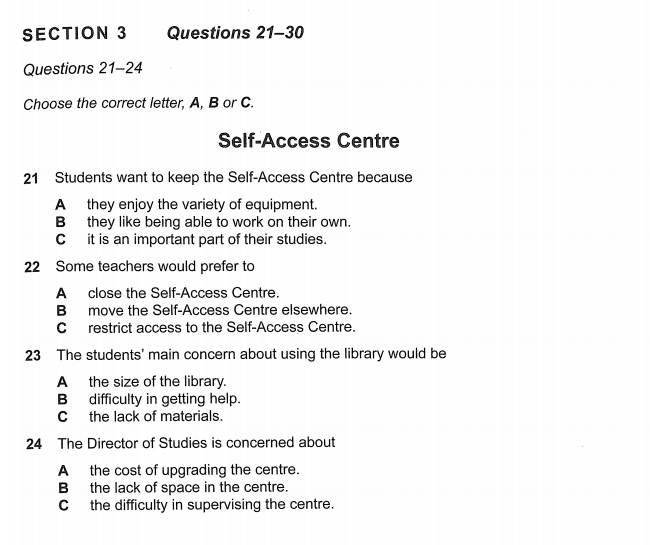剑桥雅思9听力:Test2雅思听力Section3解析
发布时间:2021-05-10 关键词:剑桥雅思9听力Section3
PAUL:Hello, Kira, how are you?
KIRA:Fine thanks, Paul, how are you?
PAUL:Well, thanks.
It's good to see you.
It must be twelve months since you did our course?
KIRA:That's right.
It's nice to come back and say hello.
PAUL:What course did you enroll in?
KIRA:Actually, I went straight into third year Pharmacy.
They credited me with two years, which probably made it more difficult for me.
PAUL:On the other hand, you were lucky to be granted credits.
Is that why you chose the course?
KIRA:Yes.
And, as I'd already finished a course in it in my country.
I thought it would be easier if I studied something I already knew.
PAUL:I didn't realise you went into third year.
I thought you started in first year No wonder it was so hard!
And what do you think is one of the big differences between studying at a university here and studying in your country?
KIRA:Well, I've found it very difficult to write assignments, because I wasn't familiar with that aspect of the system here.
The main problem is that the lecturers expect you to be critical.
That made me feel really terrible.
I thought "How can I possibly do it?
How can I comment on someone else's research when they probably spent five years doing it? "
I think a lot of people who come from overseas countries have similar problems.
But after a while it became easier for me.
People expect you to have problems with the process of reading and writing but, in fact, it is more a question of altering your viewpoint towards academic study.
PAUL:How was the content of the lectures?
Was it easy for you?
KIRA:I didn't really have many problems understanding lectures.
The content was very similar to what I'd studied before.
PAUL:And what about the lecturers themselves.
Are they essentially the same as lecturers in your country?
KIRA:Well actually, no.
Here, they're much easier to approach.
After every lecture you can go and ask them something you didn't understand.
Or you can make an appointment and talk to them about anything in the course.
PAUL:Maybe you found them different because you're a more mature student now, whereas when you were studying in your country you were younger and not so assertive.
KIRA:No, I don't think that's the difference.
Most of the students here do it.
In my faculty, they all seem to make appointments - usually to talk about something in the course that's worrying them, but sometimes just about something that might really interest them, something they might want to specialise in.
The lecturers must set aside certain times every week when they're available for students.
PAUL:That's good to hear.
PAUL:And how was your timetable?
Was it a very busy year?
KIRA:Very, very busy.
They make you work very hard.
Apart from lectures, we had practical sessions in a lot of subjects.
We did these in small groups.
I had to go and work four hours every week in a community pharmacy.
Actually, I enjoyed this very much - meeting new people all the time.
Then in second semester, we had to get experience in hospital dispensaries, so every second day we went to one of the big hospitals and worked there.
And on top of all that we had our assignments, which took me a lot of time.
Oh, I nearly forgot, between first and second semesters, we had to work full-time for two weeks in a hospital.
PAUL:That does sound a very heavy year.
So are you pleased now that you did it?
Do you feel some sense of achievement?
KIRA:Yeah, I do feel much more confident, which I suppose is the most important thing.
PAUL:And have you got any recommendations for people who are studying from overseas?
KIRA:Well, I suppose they need very good English.
It would be much better if they spent more time learning English before they enter the university, because you can be in big trouble if you don't understand what people are saying and you haven't got time to translate.
PAUL:Anything else?
KIRA:Well, as I said before, the biggest problem for me was a lack of familiarity with the education system here.
PAUL:It sounds as if it was a real challenge.
Congratulations, Kira.
KIRA:Thanks, Paul.


Question 21
答案:A
定位原文:scripts: Kira: Yes. And, as I'd already finished a course in it in my country, I thought it would be easier if I studied something I already knew.
解题思路:本题由于出现答案之前有较难短语 credit...with,可能导致考生不理解而走神。但选项与原文的对应比较直接, complete a course 和 finish a course 替换不难理解。
Question 22
答案:C
定位原文:scripts: Kira: Well, I found it very difficult to write assignments, because I wasn't familiar with that aspect of the system here. The main problem is that the lecturers expect you to be critical. That made me feel really terrible. I thought "How can I possibly do it? How can I comment on someone else's research when they probably spent five years doing it?" I think a lot of people who come from overseas countries have similar problems. But after a while it became easier for me.
解题思路:本题题干词 assignment 原文重现,Kira 提及 I’ve found it very difficult to write assignments, 使定位较为方便。之后一直在强调需要变得 critical。选项 A 及选项 B 具有混淆性,但耐心听会发现 Kira 丝毫未提及是否需要读写更快的问题,直接排除。
Question 23
答案:approach
定位原文:scripts: Kira: Well actually, no. Here, they are much easier to approach. After every lecture you can go and ask them something you didn't understand. Or you can make an appointment and talk to them about anything in the course.
解题思路:本题题干与原文答案句相似度极高。原文表述为 they’re much easier to approach, 难度不大。
Question 24
答案:mature
定位原文:scripts: Paul: Maybe you found them different because you're a more mature student now, whereas when you were studying in your country you were younger and not so assertive.
解题思路:本题读题时可以通过 be more____判断需要捕捉形容词,且形容的是目前的状态。原文中此处与目前状态相关的形容词只有 mature。
Question 25
答案:interest
定位原文:scripts: Kira: No, I don't think that's the difference. Most of the students here do it. In my faculty, they all seem to make appointments, usually to talk about something in the course that's worrying them, but sometimes just about something that might really interest them, something they might want to specialise in.
解题思路:本题题干与原文答案句相似度较髙。worry 出现之后的后半句中给出动词 interest。原文出现 but 提示之后会给出重要信息。
Question 26
答案:groups
定位原文:scripts: Kira: Very, very busy. They make you work very hard. Apart from lectures, we had practical sessions in a lot of subjects. We did these in small groups.
解题思路:题干词 practical session 原文重现,对捕捉答案起到辅助作用。之后立即出现答案 We did these in small groups。
Question 27
答案:every 2 days
定位原文:scripts: Actually, I enjoyed this very much, meeting new people all the time. Then in second semester, we had to get experience in hospital dispensaries, so every second day we went to one of the big hospitals and worked there.
解题思路:本题通过 how often 可以预测需要捕捉与时间相关的信息。题干词 hospital出现后紧接every second day。“每两天”可以表达为every 2 days或every second day。
Question 28
答案:2 weeks
定位原文:scripts: Oh, I nearly forgot. Between first and second semesters, we had to work full-time for two weeks in a hospital.
解题思路: 本题通过 how much...work 可以推测需要捕捉信息与时间或数量有关。第 27 题出现后立即给出 full time for two weeks。需要注意 27 题与 28 题答案给出较近,书写速度及反应速度要快。
Question 29
答案:confident
定位原文:scripts: Kira: Yeah, I do feel much more confident, which I suppose is the most important thing.
解题思路:本题问及 how does Kira feel,明确答案需要捕捉女孩的感觉,为形容词。I do feel much more confident 随即出现。
Question 30
答案:education system
定位原文:scripts: Kira: Well, as I said before, the biggest problem for me was a lack of familiarity with the education system here. Paul: It sounds as if it was a real challenge. Congratulations, Kira.
解题思路:本题题干中的 become familiar with 与原文 lack of familiarity with 相呼应,定位不难。




